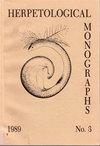Potential Hematological and Biochemical Indicators of Stress in Free-Ranging Desert Tortoises and Captive Tortoises Exposed to a Hydric Stress Gradient
IF 1
2区 生物学
Q3 ZOOLOGY
引用次数: 27
Abstract
Hematologic and plasma biochemical parameters were monitored in free-ranging desert tortoises, Gopherus agassizii, near Las Vegas, NV and on a population of captive tortoises maintained in 4 ha pens with natural physiography and vegetation and subjected to varying levels of water supplementation to mimic different levels of hydric stress. Significant increases in plasma electrolyte and urea nitrogen concentrations and white blood cell counts (compared to free-ranging and water-supplemented, captive animals) occurred in captive animals without water supplementation. Differences in electrolytes and BUN among treatments were consistent with altered water balance. Free-ranging animals received no supplemental water. Blood profiles from free-ranging animals, however, more closely resembled profiles from captive animals that received supplemental water than profiles from animals that did not receive supplemental water. Captivity, thus, altered blood profiles in a manner similar to that seen with decreased water availability. The electrolyte, urea nitrogen, and white blood cell differences among water supplementation treatments, while significant, were not sufficient to distinguish among animals from different treatments. No reliably predictive indicators of water stress-or other stresses-were found. Several biochemical assays suggested specific stresses (other than water stress) which some of the tortoises faced. We suggest that blood profiles might be more profitably used to search for specific hypothesized stressors in populations rather than as assays of unspecified generic stress on populations of tortoises.散养荒漠象龟和圈养象龟在水分胁迫梯度下的潜在血液学和生化指标
对内华达州拉斯维加斯附近自由放养的沙漠象龟(Gopherus agassizii)和圈养象龟种群进行了血液学和血浆生化参数监测,这些象龟生活在具有自然地貌和植被的4公顷围栏中,并接受不同水平的水分补充以模拟不同水平的水分胁迫。在没有补充水的圈养动物中,血浆电解质和尿素氮浓度以及白细胞计数显著增加(与自由放养和补充水的圈养动物相比)。不同处理之间电解质和尿素氮的差异与水平衡的改变一致。自由放养的动物没有补充水。然而,自由放养动物的血液特征与补充水的圈养动物的血液特征比没有补充水的动物的血液特征更接近。因此,圈养会以类似于水供应减少的方式改变血液特征。补水处理之间的电解质、尿素氮和白细胞差异虽然显著,但不足以区分不同处理的动物。没有发现水应力或其他应力的可靠预测指标。几项生化分析表明,一些陆龟面临着特定的压力(除了水压力)。我们认为,血液图谱可能更有利地用于寻找特定的假设压力源,而不是作为对乌龟种群中未指定的一般压力的分析。
本文章由计算机程序翻译,如有差异,请以英文原文为准。
求助全文
约1分钟内获得全文
求助全文
来源期刊

Herpetological Monographs
生物-动物学
CiteScore
5.40
自引率
0.00%
发文量
2
审稿时长
>12 weeks
期刊介绍:
Since 1982, Herpetological Monographs has been dedicated to original research about the biology, diversity, systematics and evolution of amphibians and reptiles. Herpetological Monographs is published annually as a supplement to Herpetologica and contains long research papers, manuscripts and special symposia that synthesize the latest scientific discoveries.
 求助内容:
求助内容: 应助结果提醒方式:
应助结果提醒方式:


